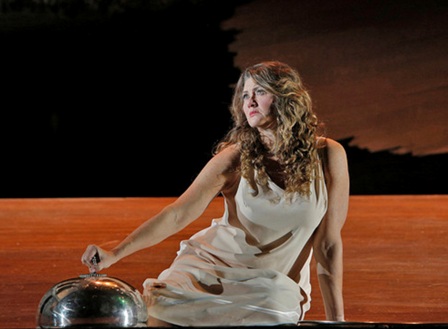By Montague Gammon III
Apocalypse turns operatic when the tale of King Herod’s stepdaughter Salomé comes to the Harrison Opera House clad in the raiments of the modern Middle East.
While the original biblical story of John the Baptist’s murder isn’t about the end of the world, John did prophesy the end of an old order, and it’s very easy to view Richard Strauss’ opera Salomé as a prime piece of apocalyptic literature.
The opera and the Oscar Wilde play upon which is based are named for the royal princess, a femme quite literally fatale, who demanded the prophet Jochanaan’s head on a platter.
“It is about the end of things,” says Stephen Lawless, stage director of Virginia Opera Association’s upcoming production. “What I wanted to get was the sense that the world is about to end at any moment…I’m not trying to make a political statement; I’m just trying to find the best way to tell the story.”
It’s a tale told by a master, full of song and fury, and stunningly intense music and voices.
Kelly Cae Hogan got rave reviews when she sang the title character for Portland Opera, with whom the VOA is co-producing the work. She’s also won huge plaudits for other roles such as Wagner’s Isolde, Verdi’s Lady Macbeth, Wagner’s Brünnhilde and André Previn’s Blanche DeBois. Those last two roles were here, in VOA productions of Die Walküre and A Streetcar Named Desire.
Lawless calls her “the absolutely fantastic Kelly Cae Hogan,” adding “Nobody else sings it with that kind of ease and that lack of strain.”
Lawless sees Herod as a sort of Saddam Hussein figure, one of those “Middle East dictators no one says “No” to,” for whom “the normal moral rules we abide by go out the window.”
Herod at least “has a conscience,” Lawless maintains, since the King is adamantly opposed to killing the holy man Jochanaan. (Until tricked by Salomé and Herodias.)
Wife Herodias “has no conscience whatever.” She’s the one who uses her own naive daughter as a weapon of revenge upon Jochanaan, who has been reviling her as an adulteress and worse because, when widowed, she married her own brother-in-law.
Lawless describes Jochanaan as “rabidly fundamentalist.”
The Wilde play from which composer Strauss closely drew his own libretto was written, Lawless says, in “hyperbolic prose” that was “directly influenced by Revelations,” itself the definitive Book of apocalyptic prophecies.
Condensed synopsis: Herod holds the prophet Jochanaan prisoner in a disused water tank, in the palace basement, into which his bombed out ballroom has collapsed. The unseen Jochanaan reviles Herodias, and Salomé, who is somewhere between 15-17 years old, asks to see this odd man whose voice enchants her. The King’s guards say that is forbidden, but finally relent, and Salome tells the emaciated prophet in detail how much he thrills her.
Jochanaan vehemently rejects her.
The King flirts with Salomé while squabbling with his wife, finally promising to reward his teen-aged stepdaughter with anything she wants up to half his kingdom, if she will dance for him.
She does, and demands the severed head of Jochanaan, the man who spurned her offer of love.
“I do feel that Salomé is more sinned against than sinning; she is the product of a toxic relationship of Herod and Herodias,” a young woman whom Jochanaan condemns “not [for] what she does but [for] who she is,” Lawless explains.
Salomé offers Jochanaan “unconditional love,” which she herself has never experienced, he says.
Lawless compares Salomé to the short-lived “mayfly…she blooms, she blossoms for this encounter with Jochanaan, and then it’s over.”
“It’s incredibly sad and tragic. The final scene is about love.”
Ms. Hogan notes “The thing that really draws me to the role is that is so dramatic and in many ways pathetic . She’s really been taken advantage of in her home life… from the play and the opera you discern that she’s been psychologically abused… [she’s been] living in a little arena…physically trapped there. On the other hand she’s most likely given everything she could want. She’s catered to and people fall over backwards. [Then] she runs up against John the Baptist who is the very first person to really deny her anything. He denies her desire.”
Lawless has developed a neat take on Salomé’s (in)famous Dance of the Seven Veils, which lifts it out of the tawdry realm of the strip-tease, avoids the distraction of nudity, and also, perhaps most importantly, makes Herod especially complicit in his own titillation. (No spoiler here!)
“The question you have to ask is ‘Who does Salomé dance for?’” the director says. “It’s supposed to be Herod, but [in her mind] she dances for Jochanaan.”
Salomé by Richard Strauss
Virginia Opera Association
Harrison Opera House, Norfolk
Jan. 30, Feb. 1 & 3
(Other performances in Richmond and Fairfax)
1-866-OPERAVA (1-866-673-7282)




